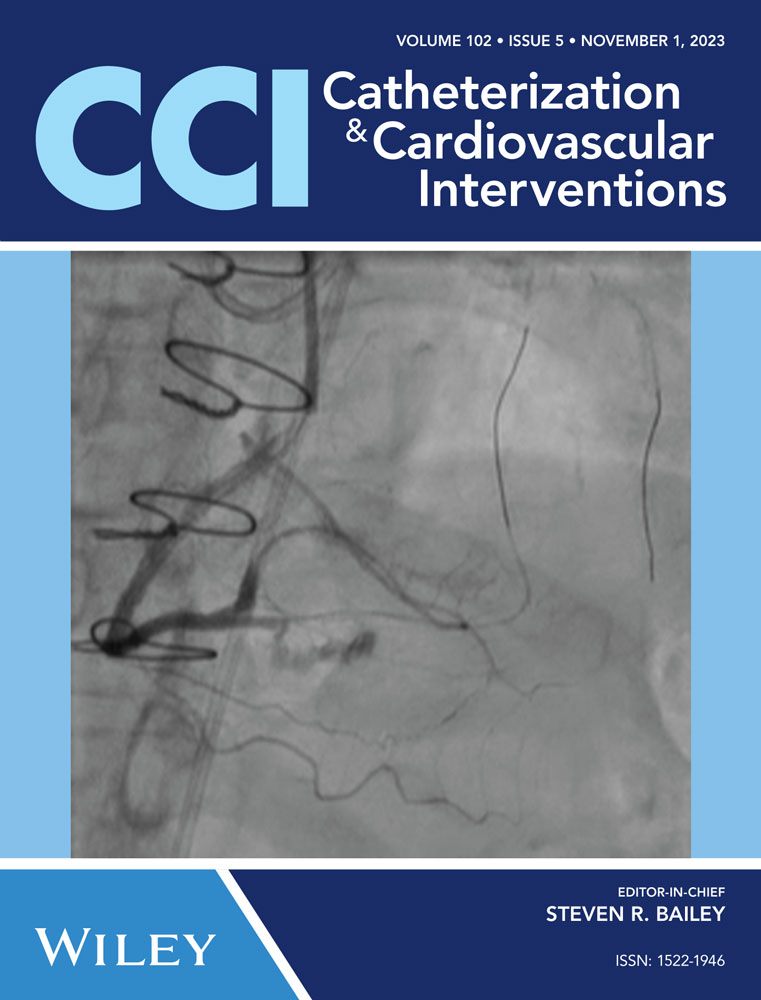Impact of preprocedural anemia on in-hospital and follow-up outcomes of chronic total occlusion percutaneous coronary intervention
Abstract
Background
The impact of preprocedural anemia on the outcomes of chronic total occlusion (CTO) percutaneous coronary intervention (PCI) has received limited study.
Methods
We examined the clinical and angiographic characteristics and procedural outcomes of 8633 CTO PCIs performed at 39 US and non-US centers between 2012 and 2023. Anemia was defined as a hemoglobin level of <13 g/dL in men and <12 g/dL in women.
Results
Anemia was present in 1652 (19%) patients undergoing CTO PCI. Anemic patients had a higher incidence of comorbidities, such as diabetes mellitus, hypertension, dyslipidemia, heart failure, cerebrovascular disease, and peripheral arterial disease. CTOs in anemic patients were more likely to have complex angiographic characteristics, including smaller diameter, longer length, moderate to severe calcification, and moderate to severe proximal tortuosity. Anemic patients required longer procedure (119 vs. 107 min; p < 0.001) and fluoroscopy (45 vs. 40 min; p < 0.001) times but received similar contrast volumes. Technical success was similar between the two groups. In-hospital major adverse cardiac events (MACE) rates were higher in patients with anemia; however, this association was no longer significant after adjusting for confounding factors. Baseline anemia was independently associated with follow-up MACE (adjusted hazard ratio [HR]: 1.63; 95% confidence interval [CI]: 1.07–2.49; p = 0.023) and all-cause mortality (adjusted HR: 3.03; 95% CI: 1.41–6.49; p = 0.004).
Conclusions
Preprocedural anemia is associated with more comorbidities, higher lesion complexity, longer procedure times, and higher follow-up MACE and mortality after CTO PCI.
CONFLICT OF INTEREST STATEMENT
Dr. James W. Choi is a member of the Medtronic advisory board. Dr. Paul Poommipanit is the consultant for Asahi Intecc and Abbott Vascular. Dr. Jaikirshan J. Khatri has received personal honoraria for proctoring and speaking from Abbott Vascular, Medtronic, Terumo, Shockwave, and Boston Scientific. Dr. Rhian Davies is the speaking honoraria from Boston Scientific, Medtronic, Siemens Healthineers, and Shockwave Medical. Dr. Farouc A. Jaffer has done sponsored research for Canon, Siemens, Shockwave, Teleflex, Mercator, and Boston Scientific; and has been a consultant for Boston Scientific, Siemens, Magenta Medical, IMDS, Asahi Intecc, Biotronik, Philips, and Intravascular Imaging Inc. He has an equity interest in Intravascular Imaging Inc., DurVena; and the right to receive royalties through Massachusetts General Hospital licensing arrangements with Terumo, Canon and Spectrawave. Dr. Lorenzo Azzalini has received consulting fees from Teleflex, Abiomed, GE Healthcare, Asahi Intecc, Philips, Abbott Vascular, Reflow Medical, and Cardiovascular Systems, Inc. Dr. Khaldoon Alaswad has been a consultant and speaker for Boston Scientific, Abbott Cardiovascular, Teleflex, and CSI. Dr. Nidal Abi-Rafeh is the Proctor and speaker honoraria from Boston Scientific and Shockwave Medical. Dr. Ahmed ElGuindy is the Consulting Honoraria: Medtronic, Boston Scientific, Asahi Intecc, Terumo; Proctorship fees: Medtronic, Boston Scientific, Asahi Intecc, Terumo. Dr. Salman S. Allana is the consultant at Abiomed and Boston Scientific Corporation. Dr. Emmanouil S. Brilakis is the consulting/speaker honoraria from Abbott Vascular, American Heart Association (associate editor Circulation), Amgen, Asahi Intecc, Biotronik, Boston Scientific, Cardiovascular Innovations Foundation (Board of Directors), CSI, Elsevier, GE Healthcare, IMDS, Medicure, Medtronic, Siemens, Teleflex, and Terumo; research support: Boston Scientific, GE Healthcare; owner, Hippocrates LLC; shareholder: MHI Ventures, Cleerly Health, Stallion Medical.




